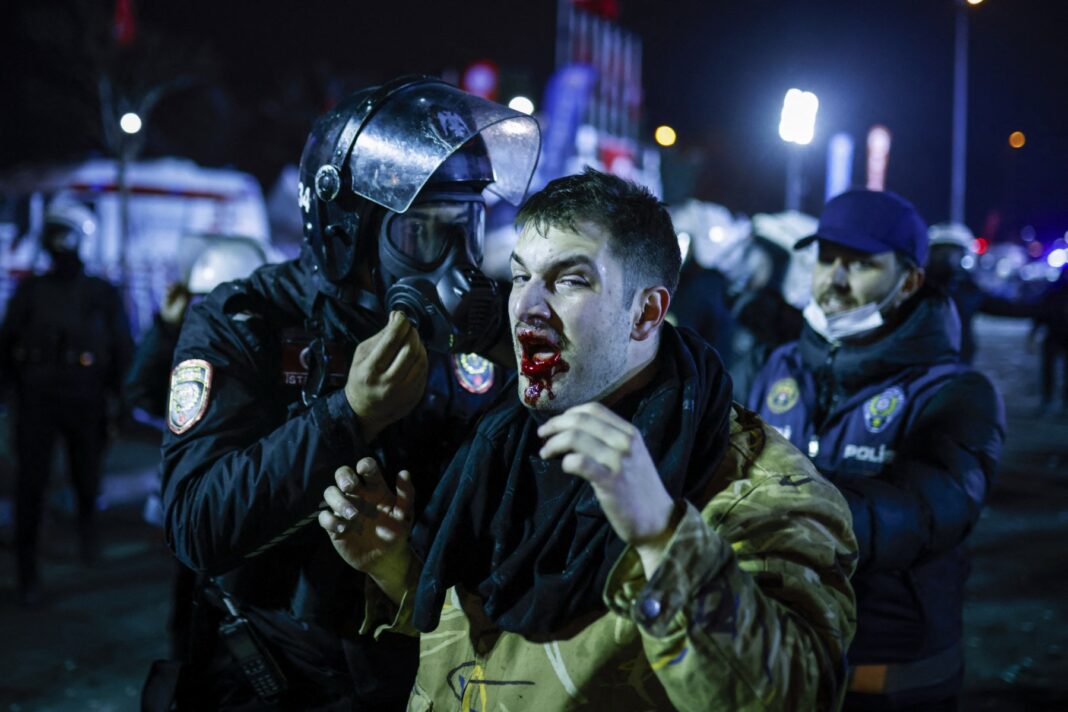A university student in İstanbul has alleged on social media that he was tortured in police custody after being detained for sharing images and videos online that showed police officers mistreating demonstrators during anti-government protests, the Stockholm Center for Freedom reported.
Eren Üner, a history student at İstanbul University, was detained on March 24 at home.
Üner had compiled and shared a series of images and videos on X that allegedly showed riot police violently dispersing demonstrators, forcing them face-down in İstanbul’s Saraçhane Park with their hands bound behind their back during protests against the detention and arrest of İstanbul’s now-deposed mayor Ekrem İmamoğlu.
Some of the footage, he said, was originally posted by the officers themselves, who included mocking or profane captions. Üner reposted the content without added commentary, identifying the officers using their publicly available social media profiles. He said his intent was to document and verify apparent misconduct, not to incite. The posts quickly went viral, attracting significant attention online.
He talked about his ordeal on X.
Üner said he was taken to the İstanbul Police Department on Vatan Street and that the beatings began even before he arrived at the station.
“During the 10–15-minute car ride, I was slapped, punched and kicked repeatedly,” Üner wrote. He said a commanding officer shouted from another vehicle, “Crush him,” before getting in the car where Üner was held and continuing the assault.
The officers first took him to a hospital for a required medical check. Despite visible injuries, he said medical staff did not document his condition. “My face was visibly bruised, especially around my ears, but the doctor did not add this to the medical report,” he said.
At the station Üner said he was put in an interrogation room. “They sat me in the middle of the room and started asking, ‘Which illegal organization are you part of?’” he said. “When I explained myself, the beatings began again.”
He also accused officers of sexual harassment and homophobic slurs. “One officer tried to touch me through my pants; another touched my chest through my sweater,” he said. “When I resisted, they called me ‘definitely gay’ and mocked me.”
According to Üner, the officers threatened to fabricate compromising images and post them from his social media account.
Üner was later transferred to Metris Prison and released on April 9. He said that since then, he has obtained medical reports from five different institutions documenting his injuries, including bruising on his face, arms, back and wrists.
Üner is now being represented by a volunteer legal team and plans to pursue charges against the officers involved.
“I will continue to fight,” he said. “I have made a promise to my friends who also suffered unjustly.”
İmamoğlu has become the latest Turkish politician or activist opposed to President Recep Tayyip Erdoğan to run afoul of the judicial authorities in what campaigners see as an intensifying pattern of repression.
Widely seen as the only politician who could defeat Erdoğan at the ballot box, İmamoğlu has been jailed on corruption charges he vehemently denies and is also being investigated in a terrorism probe.
His arrest has sparked days of protests that have spread from İstanbul across the country in Turkey’s worst unrest in over a decade.
Protests against İmamoğlu’s detention are part of a growing pattern of public unrest in Turkey, where the government has been criticized for its handling of opposition demonstrations.
Human rights groups have documented the use of excessive force, mass detentions and limitations on press and assembly freedoms. Riot police are frequently deployed during such events, and allegations of abuse in custody are not uncommon.
Torture and ill-treatment of citizens in Turkey have been longstanding concerns for domestic and international human rights organizations. After a failed 2016 coup, the Turkish government intensified crackdowns on perceived political opponents, which led to a surge in reports of torture, particularly in police custody and prisons.
A recent report by the Stockholm Center for Freedom (SCF), Torture, ill-treatment and prison conditions in Turkey: 2024 in review, documented multiple cases of torture in Turkish prisons.


